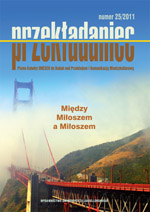Oszustwo przekładu. Czesław Miłosz i negro spirituals
TRANSLATIONS DECEIT: CZESŁAW MIŁOSZ AND NEGRO SPIRITUALS
Author(s): Katarzyna JakubiakSubject(s): Language and Literature Studies
Published by: Wydawnictwo Uniwersytetu Jagiellońskiego
Keywords: Czeslaw Milosz; negro spirituals; translation
Summary/Abstract: This article discusses the politics of translation of eleven negro spirituals, which Czesław Miłosz produced in 1948, while working as a cultural attaché of the Polish embassy in Washington, D.C. Initially, Miłosz intended to publish all of these translations in the Polish literary weekly Nowiny Literackie (Literary News). Although only a small portion of these translations appeared in print at the time, the article proposes that Miłosz’s project played a role in opposing the cultural and political Soviet domination in Poland after World War II. Drawing parallels between research on slavery and Miłosz’s analysis of power structures in post-war Poland described in The Captive Mind, the article argues that Miłosz’s translations were driven by the “ethics of deception” akin to resistance strategies inscribed in the original contexts of production of negro spirituals. The article uses theories of translation developed by deconstruction to question the traditional hierarchies between “translation” and the “original” and, consequently, to complicate Miłosz’s position as a “translator” of spirituals. Since spirituals are improvisational by origin, specific examples of Miłosz’s choices demonstrate that his role in the translation process was participatory and creative rather than imitative. Therefore, the article argues that the translation of spirituals enabled Miłosz both to be and not to be the author of these texts, a subversive move in the Soviet-dominated system, in which direct expressions of longing for freedom (only implicitly voiced in the spirituals) may not have been welcome. This interpretation is consistent with Miłosz’s other early works which outline similarities between Polish post-war and slavery/colonial experiences, and, as such, adds to current debates on the possible convergences between post-Soviet and postcolonial conditions.
Journal: Przekładaniec.
- Issue Year: 2011
- Issue No: 25
- Page Range: 203-222
- Page Count: 20
- Language: Polish

